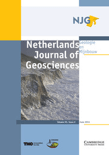
NETHERLANDS JOURNAL OF GEOSCIENCES-GEOLOGIE EN MIJNBOUW
Scope & Guideline
Connecting Researchers, Inspiring Discoveries
Introduction
Aims and Scopes
- Stratigraphy and Sedimentology:
The journal emphasizes the study of stratigraphic frameworks and sedimentological processes, with a focus on regional geology, lithostratigraphy, and biostratigraphy, particularly in the context of the North Sea Basin and surrounding areas. - Palaeontology and Fossil Record:
Research related to palaeontological findings, including trace fossils, marine and terrestrial organisms, and their implications for understanding historical biodiversity and environmental changes, is a core focus. - Geological Hazards and Induced Seismicity:
The journal addresses contemporary issues such as induced seismicity related to gas extraction and geothermal energy production, providing insights into geological hazards and their management. - Geological Mapping and Geoinformatics:
The integration of geoinformatics in geological mapping, subsurface analysis, and the use of advanced technologies for geological investigations is a recurring theme. - Quaternary Geology and Environmental Change:
Research on Quaternary geology, including landscape evolution, sea-level changes, and human interaction with geological processes during the Holocene, is a significant area of interest.
Trending and Emerging
- Induced Seismicity and Geothermal Energy:
There is a notable increase in research addressing induced seismicity, particularly in relation to geothermal energy extraction and hydrocarbon production, reflecting a broader concern for sustainable energy practices and associated geological impacts. - Palaeoecology and Climate Change:
Recent studies focusing on palaeoecological assessments and their implications for understanding climate change trends demonstrate a growing interest in how past geological events inform current environmental challenges. - Integrated Geological Modeling:
The emergence of integrated approaches combining geological, geophysical, and geochemical data for subsurface modeling and resource management has gained traction, showcasing advancements in technology and methodology in geological research. - Coastal and Marine Geology:
Research on coastal processes, landscape evolution due to rising sea levels, and marine geology is trending, likely driven by increased awareness of climate change impacts on coastal regions. - Biostratigraphy and Paleobiogeography:
An increasing number of studies are focusing on biostratigraphic correlations and paleobiogeographic patterns, which are essential for understanding historical biodiversity and the distribution of species in response to geological events.
Declining or Waning
- Jurassic and Early Cretaceous Studies:
Research pertaining to the Jurassic and Early Cretaceous periods has become less frequent, possibly due to a shift towards more recent geological periods and contemporary geological issues. - Marine Invertebrate Palaeontology:
While previously a significant focus, studies specifically targeting marine invertebrate fossils, such as molluscs and corals, are appearing less frequently, indicating a potential waning interest in this area. - Historical Geology and Geoarchaeology:
The integration of historical geology with archaeological studies has seen a decline, suggesting that researchers may be prioritizing more immediate geological challenges over historical inquiries.
Similar Journals

Journal of the Geological Society of Korea
Advancing the Frontiers of Earth SciencesJournal of the Geological Society of Korea, published by the Geological Society of Korea, is a pivotal platform for researchers and professionals in the field of geology and earth sciences. With an ISSN of 0435-4036 and an E-ISSN of 2288-7377, this journal fosters the dissemination of scholarly articles that encompass a wide range of topics within earth and planetary sciences. Despite being categorized as Q3 in both Earth and Planetary Sciences (miscellaneous) and Geology, the journal has made significant strides in contributing to academic discourse, with a Scopus rank indicating robust participation in its academic field. Located in Seoul, South Korea, the journal aims to provide a comprehensive resource for the geological community, inviting submissions from both Korean and international researchers alike. With the convergence of years from 2019 to 2024, the Journal of the Geological Society of Korea stands as a vital resource for advancing our understanding of geological phenomena and fostering collaboration within the global geosciences community.
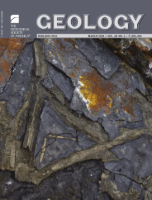
GEOLOGY
Elevating the Discourse in Earth and Planetary SciencesGEOLOGY, published by the Geological Society of America, Inc, is a premier journal dedicated to advancing knowledge, research, and discussion in the field of geology. With an ISSN of 0091-7613 and an E-ISSN of 1943-2682, this journal stands out with an impressive Q1 ranking in Geology for 2023, positioning it among the top journals in the realm of Earth and Planetary Sciences, specifically holding a remarkable rank of 11 out of 321, reflecting its 96th percentile status. This journal aims to publish innovative research articles that cover all aspects of geology, from tectonics and sedimentology to paleontology and mineralogy, offering invaluable insights for researchers, professionals, and students alike. Although not currently open access, GEOLOGY maintains a rigorous review process ensuring the quality and integrity of the research it publishes. For more than five decades, spanning from its inception in 1973 to the upcoming publications in 2024, GEOLOGY has been instrumental in shaping the geological discourse and continues to be a vital resource for the scientific community.
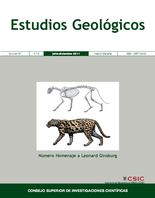
ESTUDIOS GEOLOGICOS-MADRID
Unveiling Geological Insights for a Sustainable Future.ESTUDIOS GEOLOGICOS-MADRID is a prominent journal in the field of geology, published by the esteemed Consejo Superior de Investigaciones Científicas (CSIC) in Spain. Established in 1976, this Open Access journal has been a vital resource for researchers and professionals since its inception. With an impact factor reflecting its contribution to the Earth and Planetary Sciences community, ESTUDIOS GEOLOGICOS-MADRID currently holds a Q3 category ranking in Geology as of 2023, showcasing its relevance and quality within the discipline. The journal publishes a diverse array of geological studies, ensuring wide-reaching access to significant research findings, thereby promoting collaboration and knowledge sharing. Established as a platform for both foundational research and applied geology, this journal fosters academic growth and contributes to understanding the Earth’s processes. Researchers, professionals, and students are encouraged to explore its extensive archive, which includes publications from 1976 to the present. For more information, visit the journal's editorial office at Editorial CSIC, C/VITRUVIO 8, 28006 MADRID, SPAIN.
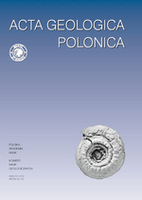
ACTA GEOLOGICA POLONICA
Pioneering discoveries in geology and beyond.ACTA GEOLOGICA POLONICA is a distinguished journal published by the Polska Akademia Nauk, in collaboration with the University of Warsaw's Geology Department. Since its inception, it has served as a vital platform for disseminating innovative research in the field of Geology, reflecting a commitment to advancing scientific knowledge in Earth and planetary sciences. With an ISSN of 0001-5709 and an E-ISSN of 2300-1887, this journal provides a rigorous review process and is classified in the Q3 quartile for Geology as of 2023, indicating its growing influence in the discipline. Despite not being open access, the journal facilitates meaningful contributions that span a range of geological topics from fundamental research to applied sciences, thereby enriching the academic landscape. Researchers, professionals, and students alike are encouraged to engage with the valuable findings and discussions contained within its pages, which continue to shape the future of geological inquiry.
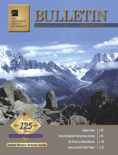
GEOLOGICAL SOCIETY OF AMERICA BULLETIN
Your Gateway to Premier Geological DiscoveriesThe Geological Society of America Bulletin (GSA Bulletin), with ISSN 0016-7606 and E-ISSN 1943-2674, is a premier scholarly journal published by Geological Society of America, Inc. Based in the United States, this journal has been a cornerstone of geological research since its inception in 1890, making significant contributions to the understanding of Earth sciences over more than a century. Recognized for its rigorous peer-review process, the GSA Bulletin currently holds a prestigious Q1 ranking in Geology, positioning it among the top 14 journals in Earth and Planetary Sciences in terms of Scopus ranking, reflecting the high quality and impact of the research it publishes. Researchers, professionals, and students alike benefit from its comprehensive coverage of geological topics, including sedimentology, volcanology, and paleontology, which supports the advancement of knowledge in the geosciences. While the journal is not open access, it continues to provide a vital platform for innovative research and critical discussions that shape the future of geology.

Geologos
Exploring Earth and Beyond: Where Knowledge Meets DiscoveryGeologos is a peer-reviewed journal dedicated to advancing knowledge in the field of Earth and Planetary Sciences. Published by SCIENDO, this Open Access journal has been facilitating unrestricted access to research findings since 2009, ensuring that scholars, professionals, and students can engage with up-to-date scientific discourse without barriers. With an ISSN of 1426-8981 and an E-ISSN of 2080-6574, Geologos is indexed in Scopus, where it currently holds a rank of #111 out of 195 in the General Earth and Planetary Sciences category, reflecting its commendable impact within the discipline. Based in Poland, the journal embraces contributions from international authors, promoting a diverse and inclusive dialogue on topics ranging from geological phenomena to planetary processes. As a Q3 journal in the Earth and Planetary Sciences category, Geologos is committed to enhancing the understanding and appreciation of the Earth's systems, making it an essential resource for those engaged in research and practice within this dynamic field.

Andean Geology
Uncovering the Secrets Beneath the AndesAndean Geology is a prominent open-access journal, published by the SERVICIO NACIONAL GEOLOGIA MINERVA in Chile, dedicated to advancing the fields of geology, geochemistry, petrology, paleontology, and stratigraphy. Since its inception in 2009, the journal has provided a vital platform for the dissemination of research pertaining to the Andean region and beyond, featuring high-quality articles that contribute to our understanding of earth sciences. With an impressive ranking in the Q2 and Q3 quartiles across multiple categories, it reflects a growing impact in the geological community, evidenced by its status within Scopus rankings. Andean Geology not only supports the academic pursuit of knowledge with its open-access policy but also aims to foster collaboration among researchers and professionals worldwide, ensuring wide accessibility of groundbreaking research and promoting academic engagement. By covering a diverse array of topics relevant to the dynamic field of geology, this journal serves as an essential resource for students, professionals, and scholars dedicated to earth and planetary sciences.
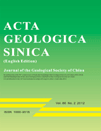
ACTA GEOLOGICA SINICA-ENGLISH EDITION
Fostering Collaboration in the Geosciences CommunityACTA GEOLOGICA SINICA-ENGLISH EDITION is a distinguished academic journal published by Wiley, providing a platform for cutting-edge research in the field of geology. With an ISSN of 1000-9515 and E-ISSN 1755-6724, this journal has been a pivotal resource since its inception in 1988, catering to scholars and professionals until 2024. The journal is recognized for its high-quality articles, achieving a Q2 ranking in the field of Geology according to the 2023 category quartiles, and ranks #122 out of 321 in the Scopus Earth and Planetary Sciences sector, placing it within the 62nd percentile among its peers. Although currently not available as an open access publication, it remains a significant repository of knowledge that supports ongoing geological research and exploration. For researchers, students, and professionals looking to deepen their understanding of geological sciences, ACTA GEOLOGICA SINICA-ENGLISH EDITION stands as an essential journal, promoting collaboration and innovation in the earth sciences.

BULLETIN OF GEOSCIENCES
Transforming Knowledge into Action for a Sustainable FutureBULLETIN OF GEOSCIENCES, published by the prestigious Czech Geological Survey, stands as a pivotal resource in the fields of Earth and Planetary Sciences and Environmental Science. Since its inception in 2003, the journal has been committed to advancing knowledge through high-quality research, currently holding a commendable Q2 ranking in both disciplines. With its focus on diverse and innovative topics, BULLETIN OF GEOSCIENCES provides an essential platform for researchers, professionals, and students aiming to disseminate and access impactful studies. The journal is indexed in Scopus, ranking #78/195 in General Earth and Planetary Sciences and #110/233 in General Environmental Science, reflecting its significant contribution to academia. Publishing from Prague, Czech Republic, this journal invites contributions that illuminate the interactions between geological processes and environmental phenomena, ensuring an inclusive and accessible approach to crucial global issues.
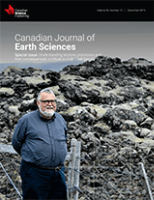
CANADIAN JOURNAL OF EARTH SCIENCES
Elevating Earth Science Discourse Since 1968Canadian Journal of Earth Sciences, published by Canadian Science Publishing, serves as a leading platform for the dissemination of cutting-edge research in the field of Earth and Planetary Sciences. Since its inception in 1968, the journal has contributed significantly to the advancement of knowledge through its rigorous peer-reviewed articles and has established itself within the Q2 category in Earth and Planetary Sciences, reflecting its strong academic reputation and research impact. With an impactful ranking of #87 out of 195 in Scopus, it is positioned within the 55th percentile, showcasing its relevance and quality in the scientific community. The journal caters to a diverse readership ranging from seasoned researchers to emerging scholars, providing vital insights into geoscience disciplines and fostering discussions on significant environmental issues. While it is not an open-access publication, the Canadian Journal of Earth Sciences remains committed to accessible research, ensuring that high-quality findings are shared widely within the Canadian and global scientific communities.